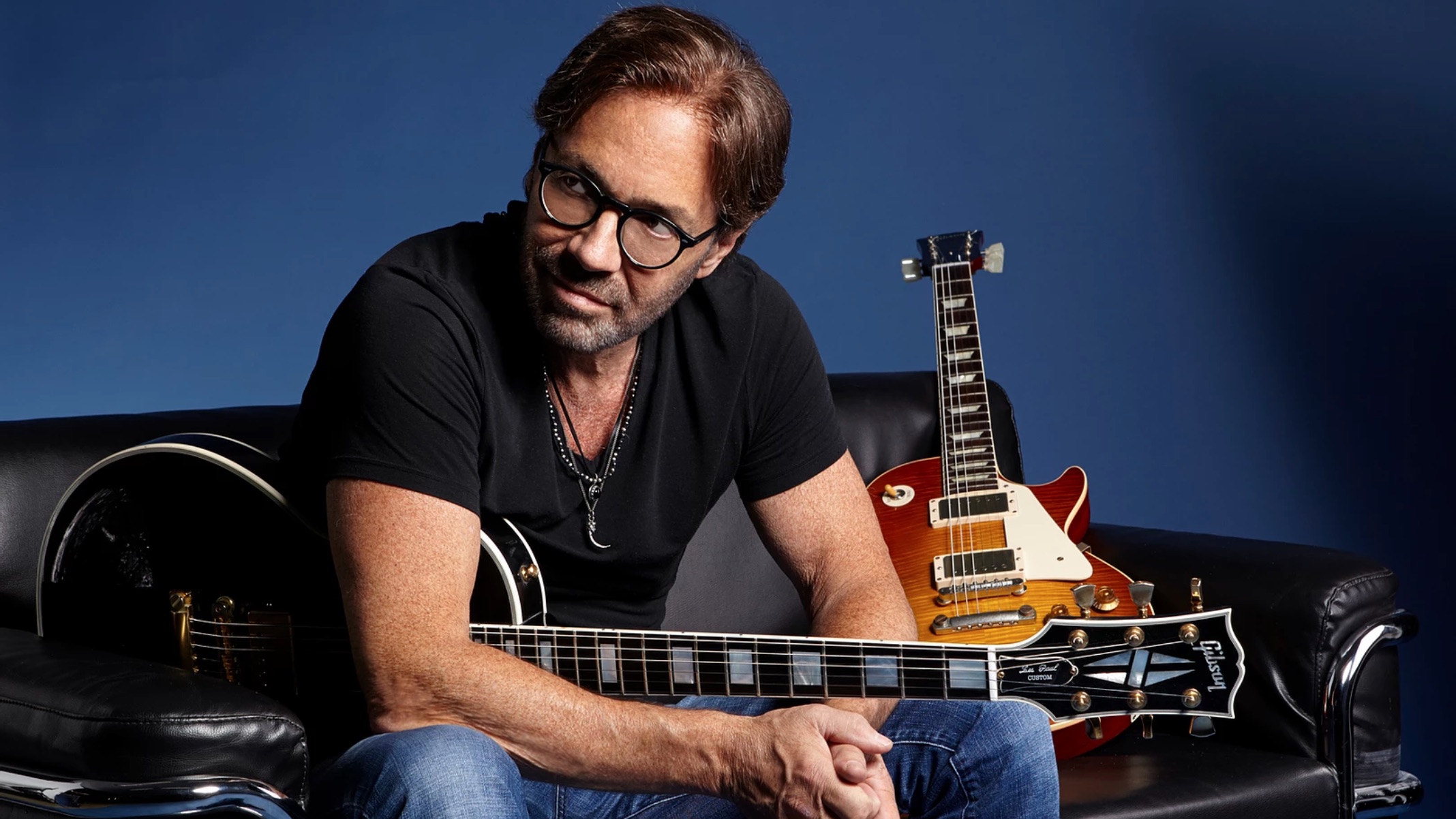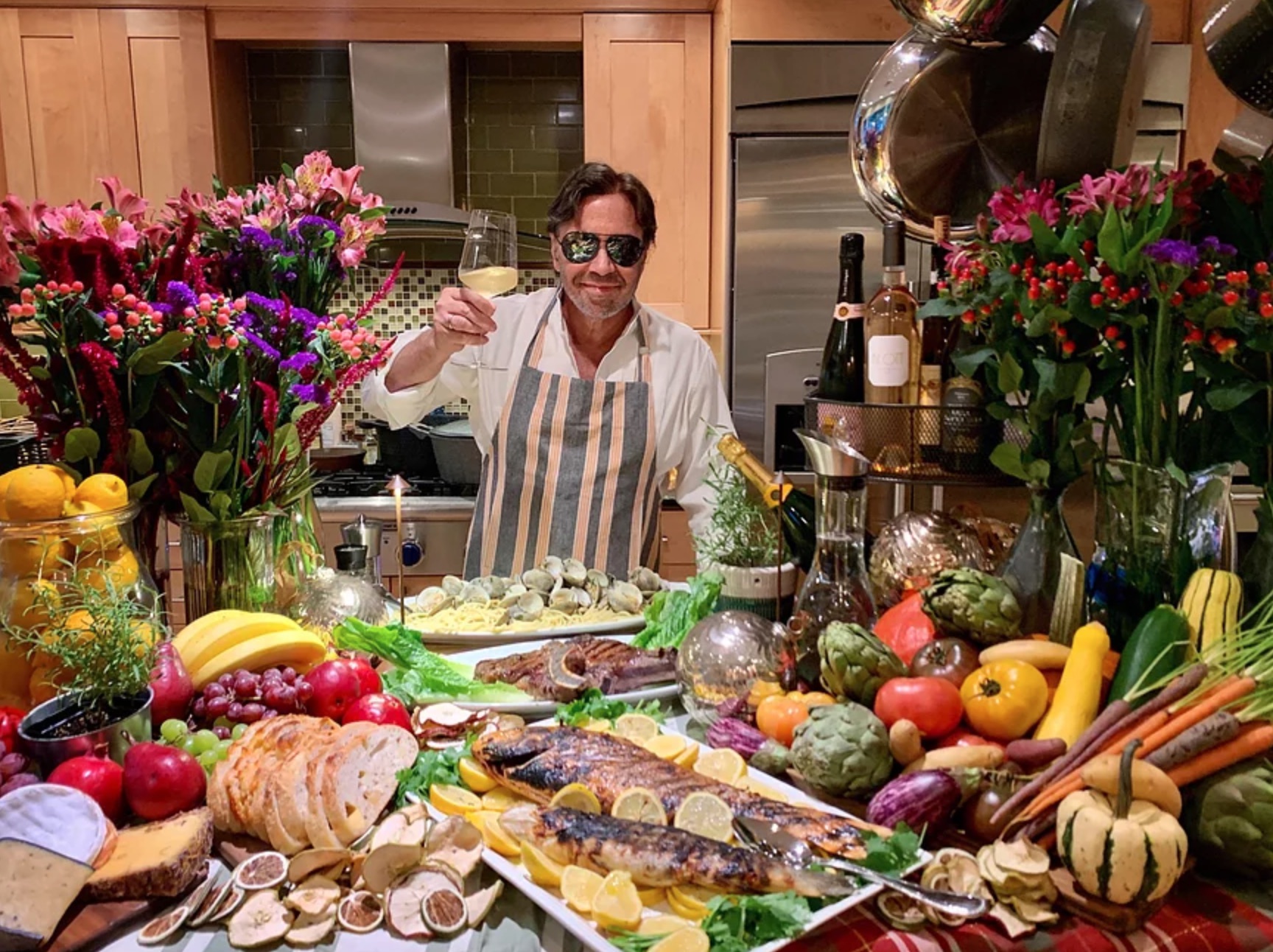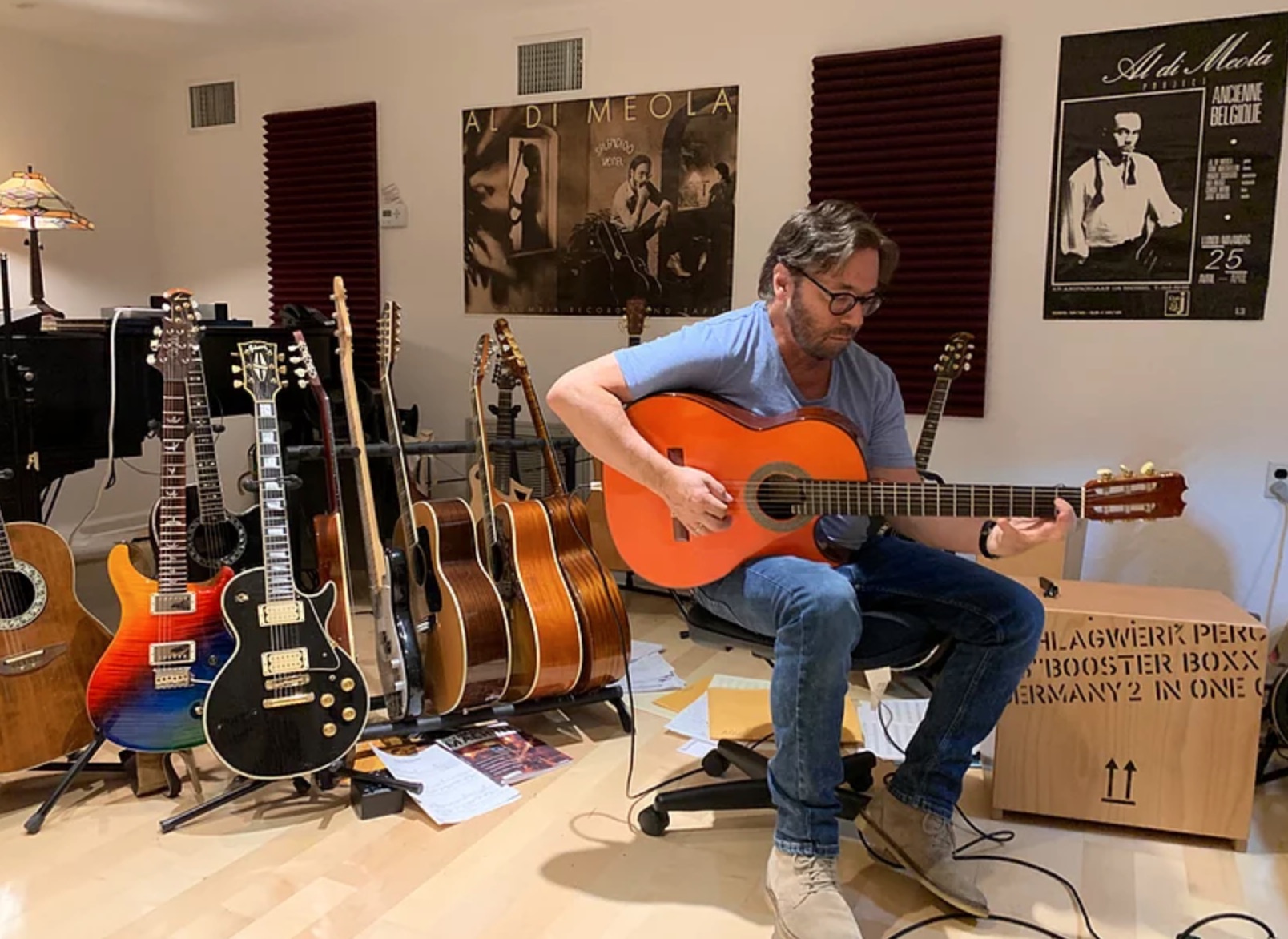Al Di Meola on his VIP dinner parties, losing Chick Corea and unearthing a new guitar trio record with John McLaughlin and Paco de Lucía
The jazz-fusion legend is spending his days writing, playing and performing – and doing plenty of cooking

Back in the 1970s, Al Di Meola became famous – at just 19 years old, mind you – for his expert ability to weave together rock, jazz, progressive and fusion styles with a mix of furious chops and a heavy, Les Paul-derived sound. And he did it while breaking land-speed (or, at least, finger-speed) records with seeming ease.
These days, Di Meola is still one of the fastest and most accomplished six-stringers among us – even if he more often than not plies his trade on an acoustic, rather than electric guitar.
He also, apparently, makes a mean pasta, as he demonstrated in 2020 with his A Fine Taste and Music house events, whereby fans were able to visit Al at his New Jersey home for a night of great food (his specialty: “Cavatelli alla Di Meola”), wine and conversation, as well as intimate, one-on-one performances, guitar lessons and a chance to check out and play Di Meola’s collection of instruments…and possibly even go home with one.
“My whole life is on display at the house,” Di Meola says. "So when people come over for dinner, they wind up getting a tour of my world.”
And while some key aspects of that world – live shows and the dinner events among them – were put on hold this past year due to the COVID-19 pandemic, 2021 is already shaping up to be a busy year in the Di Meola universe. The guitar great tells us he’s currently working on new music, the follow-up to his 2020 collection of Beatles covers, Across the Universe, and there’s also a special release in the works for the 40th anniversary of his landmark Friday Night in San Francisco acoustic guitar trio album with John McLaughlin and Paco de Lucía (but it’s not what you might expect).
Di Meola discussed this upcoming release and much more – from his dinner events to his remembrances of his former Return to Forever band mate and mentor, Chick Corea, who passed away last month at the age of 79 – in a recent chat with Guitar World.

How did the idea for the Fine Taste and Music events come about?
Get The Pick Newsletter
All the latest guitar news, interviews, lessons, reviews, deals and more, direct to your inbox!
"It was a Sunday in August, and I had a friend and his wife over at the house. My wife normally makes dinner and I said, 'Why don’t you let me cook up something really special? One of my special Italian dishes.' I was feeling real good, had a couple glasses of wine, it was a beautiful day. So I’m in the kitchen, I’m adding all these ingredients to the pasta and I was a little tipsy and I said to my wife, 'You know what? Just for the fun of it, start livestreaming.' She said, 'What?' And I said, 'Yeah, let’s do it.'
All of a sudden we had people checking in from all over the world – from Africa, from Asia, from South America, one after the other
"And all of a sudden we had people checking in from all over the world – from Africa, from Asia, from South America, one after the other. And I made a joke as I was doing it, I said, “If you like what you see you can come here, live in person! I’ll cook and we can talk and we can have dinner together…”
"I was just joking when I said it, but then afterward we read the comments and people were saying, 'Wow, what will that take? How much will that cost?' At first we thought, 'This is crazy…' But then then it became, 'Well, maybe after dinner we go downstairs and I play a private show…'
"So my wife conceived three different plans, one was dinner, one was dinner and a show, and the best package, the diamond package, that included dinner and a show, plus you get a lesson, a jam session, a signed guitar…and you get to pick the guitar. I thought, this is so unique, so original. I don’t know anybody else in the world that does this."
How many of these dinners did you do?
"I was afraid we wouldn’t even get one person. But we got the first one immediately, and then nine others came in right after that. So we did a total of 10 and then we cut it off because the winter was coming, and also COVID picked up pretty bad. But we’re going to continue it if things get better. We’re hoping to start up again in late spring or summer."
Experiencing a one-on-one concert is a pretty cool feature. What’s in the setlist?
"I play a combination of things, but mostly I play a lot of new stuff that I’ve been writing. Then I’ll go into maybe a couple of Beatles songs, because that was my last record [2020’s Across the Universe]. And then some things from previous albums. But I’m always playing some new stuff, because it’s a chance for me to try out material in front of diehard fans. And the fans get the first shot at hearing it."
This is admittedly a corny question, but do you play your 1980 song Dinner Music of the Gods?
"Well, no. I mean, I could play Dinner Music of the Gods, but I think of that as an electric piece, and these shows are mostly acoustic, so…"

You also put your guitar collection on display for you guests. Does that include the famous instruments, like your black Les Paul Custom?
"Oh, yeah. The ’71, which weighs about 400 pounds. [laughs] That’s the one I started using with Chick Corea. Which I’m selling, by the way, for the right price. And then I have a ‘59 Les Paul that was originally a sunburst, but when I got it I didn’t realize what I had and I had Gibson paint it black. That’s the one I used on [1991’s] Kiss My Axe."
So the black Les Paul you’re holding on the cover of Kiss My Axe is actually a ’59 burst?
"Yes. And you can also see my playing it in its original form in older photos. One was actually the cover of Guitar World. The only cover I was on! This goes back to the 1800s. [The issue in question is actually Guitar World November 1980.]"
Did you say you’re selling your famous ’71 Les Paul?
"Yeah. I have a little charity on the side, and I’m going to let go of a lot of my electrics because I’m playing less electric these days and I’m trying to lighten up the collection a bit. So if we can get the right price…"
You first made your name playing with Chick Corea, who passed away last month at age 79, in Return to Forever. When you think back on your time with him, what is the primary memory that comes to mind?
I came back to New Jersey from Berklee, arrived at my parents’ house and they said, 'What are you doing home?' I said, 'Well, I’m home because I’m playing Carnegie Hall on Tuesday night'
"Well, I was thrust into an already legendary group of guys, and I was very fortunate. Return to Forever was my favorite band in the world prior to joining them.
"The cool story about it is, I was at Berklee [College of Music] at the time and I had seen Return to Forever in two different versions. The first time, Bill Connors was on guitar. Then the second time I went to see them was at the Orpheum Theatre [in Los Angeles], and who was playing guitar but… Earl Klugh, who was more of an acoustic player. I see him standing there with a Les Paul, totally out of place.
"Afterward, I remember calling a good friend of mine back in New Jersey and saying, 'I wish I had a chance to play with this band. That would be a dream.' That’s all I said. I never expected that my friend, who happened to be an amateur recording engineer and who happened to have a tape of me playing, would take it upon himself to go after Chick and his management to see if they would listen to it.
"And the story I heard from Chick one day was, 'There was this guy who had a tape and he wouldn’t leave us alone. And we listened to it and were blown away.' So I wound up joining my favorite band, and three days later we were playing Carnegie Hall. That was my first show with Return to Forever."
That’s wild.
"Yeah. I came back to New Jersey from Berklee, arrived at my parents’ house and they said, 'What are you doing home?' I said, 'Well, I’m home because I’m playing Carnegie Hall on Tuesday night.' And my dad said, 'You’re not playing Carnegie Hall on Tuesday night! What are you doing home from school?' I said 'Dad, I’m actually playing Carnegie Hall.' He said, 'Get outta here! You’re not playing Carnegie Hall!' But that was how it started, all at the age of 19."
Do you have a favorite Return to Forever song?
"I think it’s probably Song to the Pharaoh Kings, off my first record [1974’s Where Have I Known You Before] with them, when I was 19. That’s a composition I play in my own band. And then on my third Return to Forever record, Romantic Warrior, the song Duel of the Jester and the Tyrant probably solidified me on the map.
"On that Romantic Warrior record I was really coming into my own. On the first record, with Song to the Pharaoh Kings, I wrote the song but I was still a baby and trying to find a way to swim in the deep end of the pool. I wasn’t there yet, no way. But by Romantic Warrior I had more confidence."
What did you learn from Chick?
"What I got from Chick was a tremendous amount. I mean, I looked up to him as a role model. He was a mentor. He had an amazing improvisatory style of playing, but his sense of timing and syncopation, and also his writing, was amazing. A lot of it worked its way into inspiring me as a writer.
"He wanted us all to write, which I thought was hugely bizarre. But he pushed us to write, which I think was the downfall in Return to Forever, because once we became well-known I think Chick then had a problem. It was no fault of ours. But we were the first band in the world that I think had a group contract and then also solo contracts for each guy."
So in your opinion, the fact that you all became writers and well known individually led to the dissolution of the classic lineup of Return to Forever, with you, Chick, Stanley Clarke and Lenny White?
"I think so. We were just about heading toward playing Madison Square Garden-type venues when Chick decided to just turn completely in another direction. Which on the one hand was upsetting, but on the other hand it was like, 'We’ll just continue with our own careers…' But of everyone, I think I was the most upset because I saw at least another five Romantic Warrior-type records."
But you continued on.
"I continued on. [1977’s] Elegant Gypsy sold millions. [1978’s] Casino sold really well. So I had a good streak. Then I decided to do the guitar trio thing [1981’s Friday Night in San Francisco with John McLaughlin and Paco de Lucía] , and it sold seven-million records. And it still sells like hotcakes."
What’s coming up for you?
"Since the lockdown I’ve been just writing a lot. Some of the material reminds me of, let’s say, an extension of a record I did back in ‘85 called Cielo e Terra. It’s very acoustic-guitar oriented, and a lot of it’s solo, with very involved pieces.
"I’m at this stage of gearing up to play what will probably be solo shows. Because I think that, initially, when shows are possible to do again, we’re not going to be able to get full bands together because of travel restrictions and smaller audiences and things like that. So I think people viewing what I’m about in a solo way will be ideal.
"And then there’s going to be a new guitar trio record [with John McLaughlin and Paco de Lucía] – that’ll be released in September."
Will that be a 40th anniversary version of Friday Night in San Francisco?
"No, not really. It’s going to be a show from the same venue… but the next night. Saturday Night in San Francisco. For 40 years, I’ve had the other night that no-one knew about except for the people that went to the show. In fact, even John didn’t remember we played a second night. [laughs]
"But I have the tapes, and I had them professionally baked to have them restored. And it turns out they’re phenomenal. And we played all different tunes. On the first record I had a song called Mediterranean Sundance. This night there’s a song called Splendido Sundance. And there’s three unaccompanied solo pieces. So you’re not getting the same record twice.
"So it's a pretty incredible thing. I'm looking forward to people hearing it. And then hopefully at some point we’ll get to bring the dinners back as well. So this year is shaping up to be pretty busy."
For more information on Al Di Meola's A Fine Taste and Music house events, head to AlDiMeola.com.
Rich is the co-author of the best-selling Nöthin' But a Good Time: The Uncensored History of the '80s Hard Rock Explosion. He is also a recording and performing musician, and a former editor of Guitar World magazine and executive editor of Guitar Aficionado magazine. He has authored several additional books, among them Kurt Cobain: Montage of Heck, the companion to the documentary of the same name.
“This particular way of concluding Bohemian Rhapsody will be hard to beat!” Brian May with Benson Boone, Green Day with the Go-Gos, and Lady Gaga rocking a Suhr – Coachella’s first weekend delivered the guitar goods
“I was writing songs from eight years old, but once I got a guitar I began to deeply identify with music… building an arsenal of influences”: How Lea Thomas uses guitars her dad built to conjure a magic synthesis of folk, pop and the ethereal











